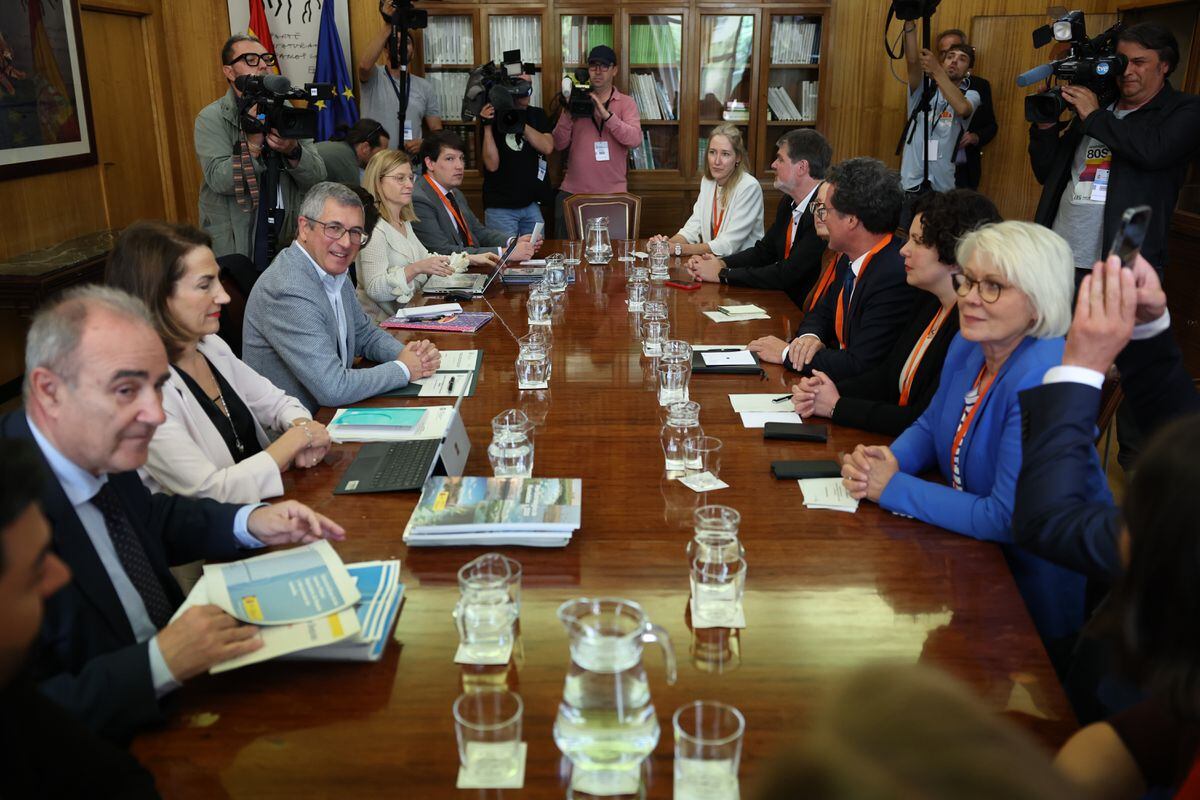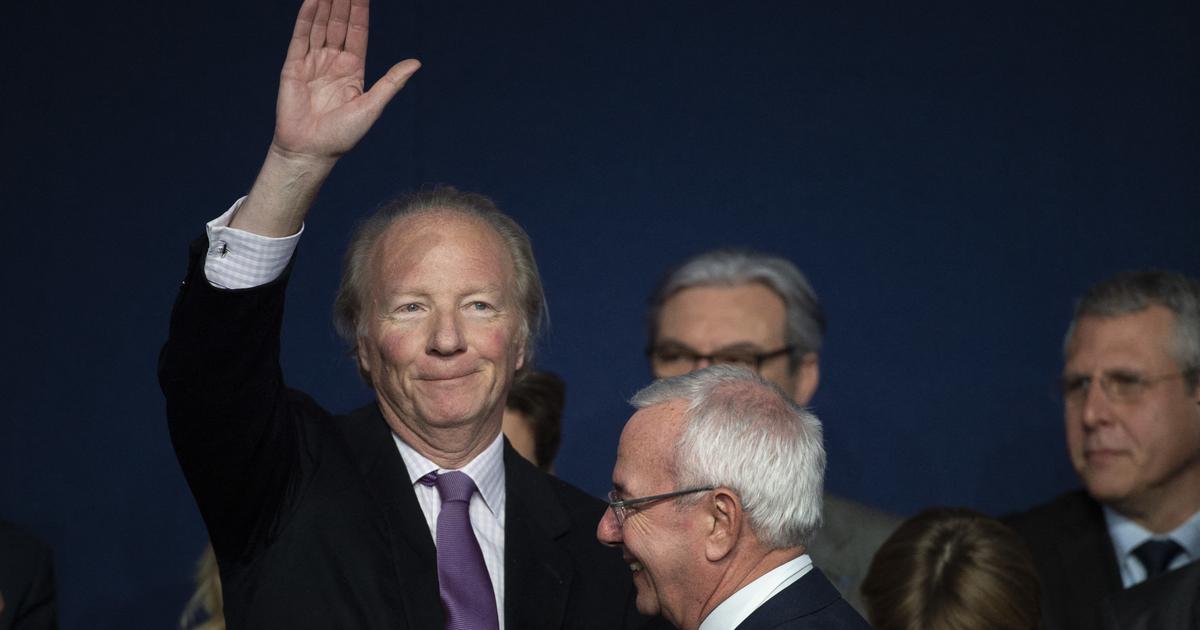The delegation of German parliamentarians who are in Spain to learn about the effects of strawberry cultivation on Doñana has announced that it is renouncing to travel to Andalusia so as not to interfere in the general elections scheduled in Spain for July 23, although it hopes to be able to do so in the future. The German delegation explained that given "the great political importance" that has been attributed to his trip in recent days, and the need to preserve mutual respect between the institutions to maintain Spanish-German relations, it is convenient to cancel it, according to a statement released by the German Parliament.
The agriculture of red fruits and its effects on Doñana have been an electoral weapon in the last municipal elections in Andalusia that has confronted the Junta (PP) with the Government, following the controversial proposal of law of the popular and Vox in the Andalusian Parliament to increase irrigation in the environment of the nature reserve. The crude confrontation between the Government and the Junta arose in spring when the right took up its bill for the greenhouses of El Condado de Huelva, continued during the 28M campaign and will probably be the subject of cross reproaches before the elections of 23-J.
The extreme drought suffered by the Guadalquivir basin, illegal wells and tourism have caused the level of the aquifer of the national park to fall to its lowest levels. This has caused biodiversity to decline dramatically, despite which the Andalusian right-wing bill plans to increase the irrigated area for strawberries by about 1,900 hectares, according to the environmental organization WWF. In this context, last week the Campact platform began a campaign to collect signatures so that German supermarket chains do not distribute Huelva strawberries due to their direct effect on Doñana, which has been followed by the visit of the deputies canceled this Monday.
This trip of the German deputies has revealed the importance of the economic consequences of the Andalusian legislative proposal, which could damage the strawberry sector next summer, when importers close the purchase agreements for next winter's harvest. The damage to Huelva's economy can be devastating.
Demonstration three weeks ago in Seville called by the platform Save Doñana.PACO PUENTES
Germany is the main importer of strawberries from Huelva, ahead of the United Kingdom, accounting for 30% of exports, with 64,800 tons and a value of 150 million last year, according to figures from the employers. 80% of the berries collected in Huelva's greenhouses travel by truck to European markets. Almería exported to Germany 926,031 tons of vegetables worth 1,262 million.
The German Parliament organises two trips each year to observe first-hand scenarios that are relevant to its interests, and in this case the Committee on the Environment and Consumer Protection chose to visit Huelva and Almeria to ascertain on the ground how their crops and beach tourism aggravate the deterioration of aquifers.
Among the experts that the parliamentarians were going to interview this Tuesday stands out the hydrogeologist Claus Kohfahl, of the Geological and Mining Institute CSIC: "The problem is the coordination of the measures, which is non-existent, and the inadequate consideration of scientific data. The inertia of the Administrations, with their lack of personnel and money, explains the illegal wells, "said this expert.
While the Ministry for the Ecological Transition has delayed for years its investment in water policy in Doñana until last November it announced a shock plan of 376 million, the Andalusian Junta wants to repeal the strawberry plan of 2014 for its environmental and agricultural actions, which it has barely implemented and now intends to modify with its bill proposal. The regional government has not announced any extraordinary investment to turn the situation around.
Kohfahl indicates that a plan would be necessary to coordinate the necessary investments in desalination plants and transfers. "And not legalize illegals," he says in reference to the proposal of the Andalusian right to provide irrigable land titles to farmers whose irrigation is now out of management. The hydrogeologist emphasizes that all the water bodies of the huge aquifer, of 2,409 square kilometers, are connected: "The divisions are mainly for administrative reasons. If [the farms] are further away, you have to see the influence, but everything is really connected." The coordinator of the PP, Elías Bendodo, often repeats that irrigation does not affect Doñana because "they are not in the park, but 30 kilometers away."
Last year, when the Andalusian right first proposed its law, 23 food distribution multinationals with 40,000 points of sale worldwide asked Andalusian President Moreno (PP) to stop their plan. Before this second legislative initiative the chains have not been coordinated, but it remains to be seen the effect of the campaign to collect signatures and if they do not end up paying just for sinners. "When the drought and the frequency of birds and biodiversity decline, the Andalusian Government strengthens its plan, which makes everything explode with virulence," reflects Juan José Carmona, head of the WWF fund for Doñana.
A dismantled greenhouse, in the municipality of Bonares, Huelva. PACO PUENTES
On the visit of the German deputies and its motivations and effects, the vice president and minister for the Ecological Transition, Teresa Ribera, has described as "indecent" the accusation of the Andalusian Junta against the Government for allegedly supporting a boycott of the strawberry of Huelva, and has clarified that the visit of the parliamentarians arose from the German lower house. "It is very important to defend Spanish farmers with deeds and not just words. And it is very important to differentiate between the legal and the illegal, and not generate doubts as Moreno Bonilla has been doing with a calculated ambiguity, "Ribera has censored. "I deeply wish a step back from the Board, it is the best way to defuse all the bombs. That the Board stop fooling around and putting at risk the irrigators and the reputation of Spain and Doñana, "he concluded.
The Andalusian Junta has continued its criticism against the Government on Monday, which it accuses of "encouraging" the signature campaign. Both Ribera and the president, Pedro Sánchez, limited themselves to lamenting on Twitter the campaign as a result of the Andalusian proposal of PP and Vox. "They come to inspect us Andalusians, it is an interference not very understandable (...) Nobody imagines that in the middle of the electoral process Spanish deputies would go to Germany to criticize the automotive industry or certain German brands, "said the Andalusian Minister of the Presidency, Antonio Sanz.
The German deputies have met this afternoon at the headquarters of the Ministry for the Ecological Transition with the Secretary of State for the Environment, Hugo Morán, but the continuation of the trip of the delegation of legislators of the Bundestag has been canceled. Tomorrow they planned to meet with the Andalusian Minister of Agriculture, Carmen Crespo (PP), representatives of the environmental organization WWF, a hydrogeologist from the Geological and Mining Institute, and visit the national park, but their trip has stopped in its tracks so as not to interfere with the pre-campaign.
The Committee on the Environment, Nature Protection, Nuclear Safety and Consumer Protection of the German Bundestag (Parliament) has stressed in a statement that Spanish-German relations are based on an "intense exchange at all levels" and are characterized by a deep mutual respect for the institutions and democratic processes of the other country. For the sake of that respect and "in view of the great political importance" that the topics of the trip have acquired in recent days in the face of the next Spanish national elections, the parliamentary commission has decided to "renounce for the moment its long-planned trip to Andalusia," according to its statement.
The commission of the German Chamber reiterates that both countries are united by a friendship based on trust "that has been growing over the years" and clarifies that the objective of the trip was "to exchange technical information on a topic that interests" both countries, such as climate change and its consequences, The statement said. The deputies had planned to visit Seville, Huelva, Malaga and Almeria after passing through Madrid, to verify the effects generated by agriculture that produces vegetables and fruits consumed by German citizens on Spanish ecosystems.













/cloudfront-eu-central-1.images.arcpublishing.com/prisa/S7ERVSCT4FUVX6R7TUVBDNTH5Y.jpg)

